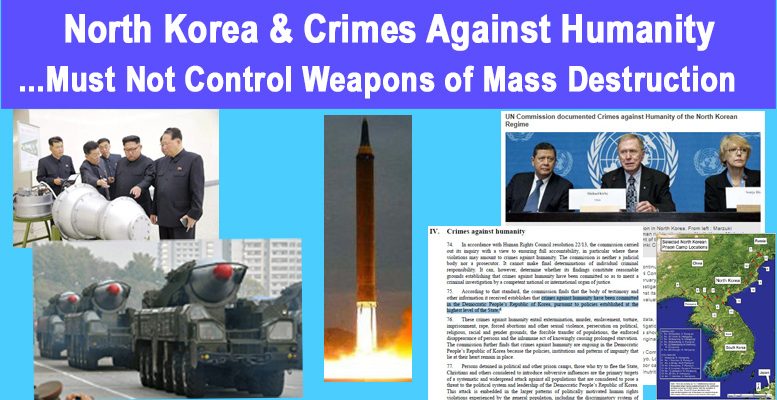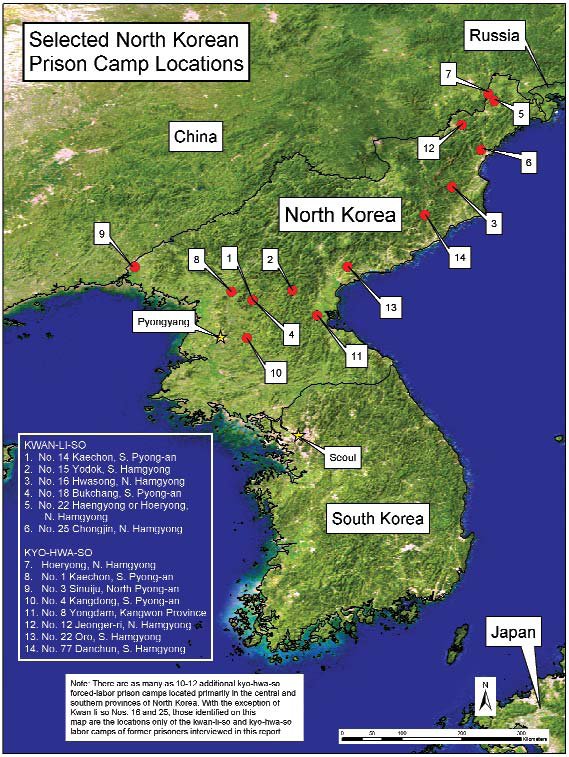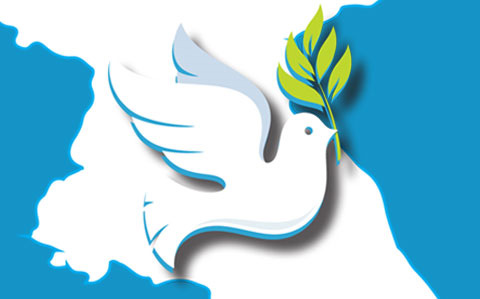Responsible for Equality And Liberty (R.E.A.L.) has long supported the human rights and dignity of North Korea people, and those held captive and kidnapped by its totalitarian government. It is astounding that in the political partisan charged environment of 2017, so many are willing to ignore and forget the ongoing Crimes Against Humanity by the Communist North Korea government, its leadership, and as documented not only by the United Nations, but also by defectors from that totalitarian regime.
Humanity cannot simply “forget” an unrepentant totalitarian regime which continues to commit, and has a long history of Crimes Against Humanity. The long history of horrific murders, concentration camps, and inhuman treatment against its own citizens should give ethical pause to those who believe North Korea can be responsible and restrained once it has nuclear weapons of mass destruction.
On March 21, 2013, the United Nations Human Rights Council announced that it had “established the Commission of Inquiry on Human Rights in the Democratic People’s Republic of Korea (DPRK). Resolution A/HRC/RES/22/13 mandates the body to investigate the systematic, widespread and grave violations of human rights in the Democratic People’s Republic of Korea, with a view to ensuring full accountability, in particular for violations which may amount to crimes against humanity.” The U.N. stated that among the violations to be investigated were “those pertaining to the right to food, those associated with prison camps, torture and inhuman treatment, arbitrary detention, discrimination, freedom of expression, the right to life, freedom of movement, and enforced disappearances, including in the form of abductions of nationals of other States.”
In 2014, the United Nations provided a report on these North Korea Crimes Against Humanity, by the UN Commission of Inquiry (COI) on the human rights situation in North Korea. It issued a 36 page summary, and a nearly 400 page report of its full findings. As the International Society of Human Rights (ISHR) reported, “Since the UN experts were denied entry to North Korea, the Commission interviewed 80 witnesses in public hearings and 240 people behind closed doors in Seoul, Tokyo, London and Washington on the situation in North Korea.” The U.N. commission’s public hearings are still available for the public to see.
The U.N. commission’s report summarized “crimes against humanity” by the North Korea government. The U.N. commission reported that: “the commission finds that the body of testimony and other information it received establishes that crimes against humanity have been committed in the Democratic People’s Republic of Korea, pursuant to policies established at the highest level of the State.” It stated “These crimes against humanity entail extermination, murder, enslavement, torture, imprisonment, rape, forced abortions and other sexual violence, persecution on political, religious, racial and gender grounds, the forcible transfer of populations, the enforced disappearance of persons and the inhumane act of knowingly causing prolonged starvation. The commission further finds that crimes against humanity are ongoing in the Democratic People’s Republic of Korea because the policies, institutions and patterns of impunity that lie at their heart remain in place.” “Persons detained in political and other prison camps, those who try to flee the State, Christians and others considered to introduce subversive influences are the primary targets of a systematic and widespread attack against all populations that are considered to pose a threat to the political system and leadership of the Democratic People’s Republic of Korea. This attack is embedded in the larger patterns of politically motivated human rights violations experienced by the general population, including the discriminatory system of classification of persons based on songbun.” “In addition, the commission finds that crimes against humanity have been committed against starving populations, particularly during the 1990s. These crimes arose from decisions and policies violating the right to food, which were applied for the purposes of sustaining the present political system, in full awareness that such decisions would exacerbate starvation and related deaths of much of the population.” “Lastly, the commission finds that crimes against humanity are being committed against persons from other countries who were systematically abducted or denied repatriation, in order to gain labour and other skills for the Democratic People’s Republic of Korea.”
The UN Commission of Inquiry on the human rights situation in North Korea concluded that: “Systematic, widespread and gross human rights violations have been and are being committed by the Democratic People’s Republic of Korea, its institutions and officials. In many instances, the violations of human rights found by the commission constitute crimes against humanity. These are not mere excesses of the State; they are essential components of a political system that has moved far from the ideals on which it claims to be founded.”
The U.N. commission concluded: “The gravity, scale and nature of these violations reveal a State that does not have any parallel in the contemporary world. Political scientists of the twentieth century characterized this type of political organization as a totalitarian State: a State that does not content itself with ensuring the authoritarian rule of a small group of people, but seeks to dominate every aspect of its citizens’ lives and terrorizes them from within.”
The U.N. commission further concluded that “The Democratic People’s Republic of Korea displays many attributes of a totalitarian State: the rule of a single party, led by a single person, is based on an elaborate guiding ideology that its current Supreme Leader refers to as ‘Kimilsungism-Kimjongilism’. The State seeks to ensure that its citizens internalize this guiding ideology by indoctrinating citizens from childhood, suppressing all political and religious expression that questions the official ideology, and tightly controlling citizens’ physical movement and their means of communication with each other and with those in other countries. Discrimination on the basis of gender and songbun is used to maintain a rigid social structure that is less likely to produce challenges to the political system.” “The key to the political system is the vast political and security apparatus that strategically uses surveillance, coercion, fear and punishment to preclude the expression of any dissent. Public executions and enforced disappearance to political prison camps serve as the ultimate means to terrorize the population into submission. The State’s violence has been externalized through State-sponsored abductions and enforced disappearances of people from other nations. These international enforced disappearances are unique in their intensity, scale and nature.” “Today, the Democratic People’s Republic of Korea finds itself surrounded by a world that is changing rapidly in political, economic and technological terms. These changes offer opportunities for incremental social change within the State. Inresponse, the authorities engage in gross human rights violations so as to crack down on ‘subversive’ influences from abroad. These influences are symbolized by films and soap operas from the Republic of Korea and other countries, short-wave radio broadcasts and foreign mobile telephones. For the same reason, the State systematically uses violence and punishment to deter its citizens from exercising their human right to leave the country. Persons who are forcibly repatriated from China are commonly subjected to torture, arbitrary detention, summary execution, forced abortion and other forms of sexual violence.”
The U.N. commission also concluded: “A number of long-standing and ongoing patterns of systematic and widespread violations, which were documented by the commission, meet the high threshold required for proof of crimes against humanity in international law. The perpetrators enjoy impunity. The Democratic People’s Republic of Korea is unwilling to implement its international obligation to prosecute and bring the perpetrators to justice, because those perpetrators act in accordance with State policy.” “The fact that the Democratic People’s Republic of Korea, as a State Member of the United Nations, has for decades pursued policies involving crimes that shock the conscience of humanity raises questions about the inadequacy of the response of the international community.” The commission further called for action by the International Criminal Court (ICC): “The Security Council should refer the situation in the Democratic People’s Republic of Korea to the International Criminal Court for action in accordance with that court’s jurisdiction. The Security Council should also adopt targeted sanctions against those who appear to be most responsible for crimes against humanity.”
Michael Kirby, Chairman of the UN Commission on North Korea, stated at a press conference after the commission issued its report on February 17, 2017: “These are the ongoing crimes against humanity happening in the DPRK which our generation must tackle urgently and collectively. The rest of the world has ignored the evidence for too long. Now there is no excuse because now we know.” “At the end of the Second World War, so many people said ‘If only we had known…!’ Now the international community does know…. there will be no excusing a failure of action.” The Chairman of the U.N. Commission also directly linked Kim Jong Un to these Crimes Against Humanity, stating: “as all lines of authority stop at the Supreme Leader the question was also presented to the commission as to whether the Supreme Leader of DPRK Kim Jong Un would or may himself be responsible for the Crimes Against Humanity.” The Chairman of the U.N. commission stated that as they were “not a prosecutorial body,” it was not their role to make that determination, but now the world had the facts and report on the Crimes Against Humanity in North Korea.
Over the years, endless reports of witnesses of such Crimes Against Humanity by North Korea have come forward to speak, as reported by the BBC, the Daily Mail, and many other media sources. Former North Korea prison guard Lim Hye-jin reported on the routine murders, torture, beheadings, and setting people on fire alive in the North Korea concentration camps. The many witnesses reported of endless and merciless Crimes Against Humanity by North Korea in these concentration camps. Some have compared the Communist North Korea concentration camps to Adolf Hitler’s horrific death camps. But one escapee, Kang Chol-hwan, stated that the protracted torture in North Korea camps had a different focus: “While Auschwitz’s goal was rapid, industrial-style extermination, Yodok prolongs the suffering over three generations. ‘The purpose of Yodok is to be but one facility that helps sustain the regime and cleanse the North Korean people of any freedom of thought.'” According to One Free Korea, “The Committee for Human Rights in North Korea estimates that North Korea holds as many as 120,000 people in its system of concentration and detention camps, and that 400,000 people have died in these camps from torture, starvation, disease, and execution.”
After the terrorist murder of Kim Jong Nam using chemical weapon VX by North Korea in Malaysia airport in 2016, the Voice of America reported that: “In 2014 the United Nations General Assembly voted to refer North Korea to the International Criminal Court (ICC) for crimes against humanity, after a Commission of Inquiry report documented ongoing atrocities in North Korea that include incarcerating over 120,000 people in political prisons, as well as systematic abuses that included torture, enslavement, rape and murder. The measure has since stalled in the U.N. Security Council, where the Pyongyang’s allies, China and Russia, are believed to be preventing it from coming to a vote.”
On March 24, 2017, the U.N. Human Rights Council passed a resolution (without a vote) to authorize the use of criminal justice experts to develop legal approaches in the eventual prosecution of North Korea for these crimes against humanity. Yet nothing has happened on this, and in the interim, the Communist North Korea totalitarian nation accused of such Crimes Against Humanity continue to develop more and more advanced nuclear weapons of mass destruction.
The protracted history of Communist North Korea’s totalitarian government, its use of an ethnic nationalism based on minjok concept of racial superiority (analyst Brian Myers calls it “race-based paranoid nationalism”), and its well-documented Crimes Against Humanity must be taken seriously as a priority by the international community. The idea that Communist North Korea is being permitted, due to the continuing failure of Communist China and Russia to act on serious sanctions and international law, to stop the growth of such Crimes Against Humanity, while simultaneously failing to stop Communist North Korea’s ambitions for nuclear weapons of mass destruction, is nothing less than contempt for international human rights and security. The growing threats by Communist North Korea to commit attacks on Japan, South Korea, the United States, and any others that might halt its aggressive ambitions, must be challenged and rejected.
R.E.A.L. calls upon the international community, including Communist China and Russia, to take meaningful and significant steps to stop the nuclear weapons of mass destruction sought by North Korea, which has been documented in committing Crimes Against Humanity.
R.E.A.L. calls upon the people in North Korea to reject the direction of their leaders in seeking to make war and violence against the world, and to sacrifice the lives of North Korea people as acceptable. Such calls for violence and threats are an attack on our shared human rights, and the North Korea public who have long suffered under terrible conditions deserve the same basic human rights as the rest of the world’s public, under our shared universal human rights. Our human rights of security are not the right to threaten to attack and destroy people and nations around the world. R.E.A.L. urges the North Korea public to call for an end to these threats and calls for violence.
Choose Love, Not Hate. Love Wins.


